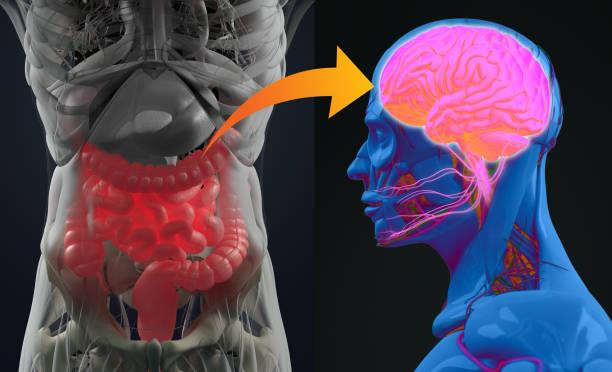
Have you ever noticed changes in your stomach when you’re nervous or anxious — that feeling of butterflies in your stomach, nausea, loss of appetite, or even minor stomach aches and loose motions?
This is not just a coincidence — it’s an indicator of the strong connection between your brain and your gut, known as the gut-brain axis.
This amazing two-way communication network plays an integral role in your overall well-being, influencing not only digestion but also mental clarity, emotional stability, and sleep quality.
The gut-brain axis is a complex communication system between the gastrointestinal tract (the gut) and the central nervous system (the brain).
It functions through several important pathways — including neural connections (especially the vagus nerve), hormonal signaling, immune responses, and gut microbiota activity.
At the heart of this connection lies the gut microbiome — an intricate ecosystem of trillions of bacteria and other microbes living in your gut. These microbes aren’t passive; they actively influence how your body processes nutrients and how it produces and regulates neurotransmitters — the chemical messengers that control mood, cognition, and overall brain function.
The brain’s “second brain,” called the enteric nervous system (ENS), contains over 100 million neurons located in the lining of the gut. The ENS can function independently of the brain and spinal cord and primarily regulates digestion — but it also communicates directly with the brain.
Mental clarity and concentration depend heavily on gut health.
The gut produces many neurotransmitters essential for brain function. One of these is acetylcholine, which supports memory and learning — and its production relies on a healthy gut.
When the gut becomes inflamed due to a poor diet, mental performance can decline, leading to brain fog, lack of focus, and slower processing speed.
A diet that supports gut health can significantly boost mental clarity.
Foods rich in omega-3 fatty acids — such as avocados, walnuts, chia seeds, flaxseeds, and fatty fish — help reduce inflammation and improve brain performance.
Fermented foods like curd, yogurt, idli, dhokla, and kimchi nourish the gut with beneficial bacteria, further enhancing concentration and clarity.
Fiber-rich foods such as green vegetables, fruits, oats, and quinoa promote digestion and maintain a balanced gut microbiome — both essential for long-term cognitive function and clear thinking.
Your mood is closely linked to gut health.
Nearly 90% of serotonin, the “feel-good” neurotransmitter, is produced in the gut — not the brain.
Other mood-regulating neurotransmitters such as dopamine and GABA are also controlled by the gut microbiota.
A healthy and diverse gut microbiome promotes balanced neurotransmitter synthesis, resulting in emotional stability and resilience.
However, an inflamed or imbalanced gut disrupts this balance, increasing the risk of anxiety and depression.
According to India’s top dietitian Prachi Shah, one of the most renowned weight-loss experts, nourishing the gut with prebiotic and probiotic foods is key to maintaining emotional well-being.
Together, prebiotics and probiotics help restore microbial health — especially after illness or antibiotic use.
On the other hand, ultra-processed foods, added sugars, and artificial sweeteners can harm the gut, increase inflammation, and disrupt mood stability.
A balanced, wholesome diet sets the foundation for a stable and positive emotional state.
Sleep quality is another major area where the gut-brain axis plays a vital role.
Your gut and brain work together to regulate your circadian rhythm — your body’s internal clock that controls the sleep-wake cycle.
When the gut microbiome is inflamed, melatonin production (the sleep hormone) is disrupted. This can lead to insomnia, poor sleep quality, or waking up tired despite a full night’s rest.
Poor sleep, in turn, increases cortisol levels, affects muscle recovery, body fat composition, and disturbs gut health further.
To promote deeper, more restful sleep:
When the gut-brain axis is out of sync, your body shows clear warning signs:
These symptoms may indicate that your gut health needs attention — and restoring balance can significantly improve both physical and mental well-being.
The foundation of a healthy gut-brain connection lies in a diverse, whole-food-based diet.
The Indian diet, rich in fiber, complex carbs, healthy fats, and lean proteins, naturally supports gut diversity and balance.
The gut-brain axis is a powerful link that influences every aspect of your well-being — from digestion and mood to mental clarity and sleep.
By nurturing your gut through a balanced diet, hydration, and mindful living, you can restore harmony between your gut and brain — paving the way for better mental health, emotional balance, and overall vitality.
Connect with Dietitian Prachi Shah today to get a personalized plan that improves your gut health, mood, and sleep naturally.
I’d love to learn more about you and how we can work together to get our healthy meals on the table.